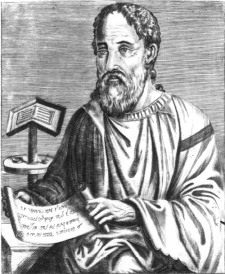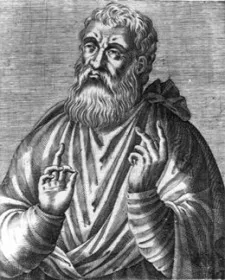Ignatius and the Doctrine of the Trinity
Ignatius, one of the most important witnesses to the apostolic era, has some unusual comments in his letters. In the introduction to his letter to the Ephesians, he refers to "the will of the Father and Jesus Christ, our God."
This reference to Jesus Christ as God while the Father is being mentioned seems to be an exception to Tertullian's terminology concerning the Trinity.
I don't have any explanation for this other than that there's nothing in this terminology that violates the Nicene faith. This terminology is unique to Ignatius, who is a notable but lone exception.
He also refers to "the blood of God" in chapter one of that same letter. This sort of terminology can be found in
Acts 20:28 as well.
Make no mistake, however. Ignatius' views are not an exception. Quotes like: " … in one faith of God the Father and of Jesus Christ his only-begotten Son, the first-born of every creature" are throughout his writings.
Here's another one:
He sent the Word that he might be manifested to the world … This is he who was from the beginning, who appeared as if new, and was found old, yet is ever born afresh in the hearts of the saints. This is he, who being from everlasting, is today called the Son. (ch. 11)
Justin Martyr
There are other Christian writers between the
Letter to Diognetus and Justin Martyr, but none of them say anything clearly about the doctrine of the Trinity, except perhaps this quote from Clement of Rome:
The apostles have preached the Gospel to us from the Lord Jesus Christ; Jesus Christ [has done so] from God. (
First Clement 42).
Justin, on the other hand, says a lot about the doctrine of the Trinity because he's having to explain to a Jew why Christians call more than one Divine Person God.
He actually makes his first mention of the Divine
Logos in his letter to the emperor, referred to as
First Apology. He argues that the
Logos imparted wisdom to Socrates in order to allow him to correct the demon worship of the Greeks.
Not only among the Greeks did
Logos prevail to condemn these things through Socrates, but also among the barbarians were they condemned by the
Logos himself, who took shape, became man, and was called Jesus Christ. (ch. 5)
He is very direct in
Dialogue with Trypho, a Jew
God begat before all creatures a Beginning, a certain rational power from himself, who is called by the Holy Spirit … the glory of the Lord, then the Son, again Wisdom, again an Angel, then God, and then Lord and
Logos. (ch. 61)
An artist's depiction of Justin Martyr
Justin even provides illustrations of how such a begetting might have happened!
He was begotten of the Father by an act of will, just as we see happening among ourselves. For when we give out some word, we beget the word; yet not by cutting off so as to lessen the word in us … just as we see happening in the case of a fire, which is not lessened when it has kindled [another], but remains the same. And that which has been kindled by it likewise appears to exist by itself, not diminishing that from which it was kindled. (ibid.)
He then adds the typical reference to
Proverbs 8:22:
The Word of Wisdom, who is himself this God begotten of the Father of all things—and Word, Wisdom, Power, and the Glory of the Begetter—will bear witness to me when he speaks by Solomon the following: " … The Lord made me the beginning of his ways for his works. From everlasting he established me in the beginning before he had made the earth." (ibid.)
Justin's belief in Jesus as the
Logos of God generated in eternity past is so clear that references are made to Justin's "
Logos doctrine." However, his
Logos doctrine is the same one that all other well-instructed early Christians believed.
debatepolitics.com









